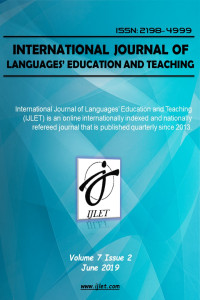Türkçenin Yabancı Dil Olarak Öğretilmesinde Eylem Odaklı Yaklaşım ve Öğrenenlerin Tutumlarına Yönelik Etkisi
Öz
Bu araştırmanın amacı Türkçenin yabancı dil olarak öğretildiği öğrenme ortamlarında eylem odaklı
yaklaşımın öğrenenlerin yabancı dil öğrenmeye yönelik tutumları üzerindeki etkisini sınamaktır.
Çalışma Ondokuzmayıs üniversitesi Türkçe Öğretim Merkezinde gerçekleştirilmiş olup çalışma
kapsamında deney ve kontrol grubu olmak üzere toplamda 32 öğrenciden oluşan iki farklı grup
belirlenmiştir. Deney grubu öğrencilerine A1-A2 kuru boyunca Diller için Avrupa Ortak Başvuru
Metninde önerilen dil öğretim yaklaşımı olan eylem odaklı yaklaşıma yönelik hazırlanan ders
içerikleri uygulanırken kontrol grubu öğrencilerine geleneksel yönteme uygun ders içeriği
uygulanmıştır. Çalışma A1 ve A2 kuru olmak üzere 280 ders saati sürdürülmüş olup her iki gruba da
çalışma öncesi ve sonrası olmak üzere Abidin, Mohammadi ve Alzwari (2012) tarafından geliştirilen
45 maddelik tutum ölçeği uygulanmıştır. Verilerin analizinde T-testi, Mann Whitney-U testi ve
Wilcoxon işaretli sıralar testi kullanılmıştır. Araştırmanın bulguları, eylem odaklı yaklaşıma yönelik
hazırlanan ve deney grubuna uygulanan dil öğretim programının, öğrencilerin yabancı dil olarak
Türkçeyi öğrenmelerine yönelik tutumlarını anlamlı derecede arttırdığını göstermiştir. Kontrol grubu
ön test-son test farkıyla deney grubunun ön test-son test farkları karşılaştırıldığında ise yine deney
grubu lehine istatistiksel olarak anlamlı farklılık görülmüştür. Ortaya çıkan bu farklılığın etki
büyüklüğü hesaplandığında ise deney grubu lehine çok yüksek bir etki büyüklüğü ortaya çıkmıştır.
Bu sonuçlar dikkate alındığında eylem odaklı yaklaşımın öğrenenlerin tutumları üzerinde olumlu bir
etkiye sahip olduğu anlaşılmaktadır
Anahtar Kelimeler
Yabancı dil Türkçe eylem odaklı yaklaşım tutum dil öğretim ortamları
Kaynakça
- Abidin, M. J. Z., Mohammadi, M. P. & Alzwari, H. (2012). EFL Students’ Attitudes towards Learning English Language: The Case of Libyan Secondary School Students. Asian Social Science 8(2).
- Aida, Y. (1994) Examination of Horwitz, Horwitz and Cope’s Construct of Foreign Language Anxiety: The case of Students of Japanese. The Modern Langauge Journal, 78(2), 155-168.
- Al-Zahrani, M. (2008). Saudi Secondary School Male Students’ Attitudes Towards English: An exploratory study. J, King Saudi University, Language and Translation, 20, 25-39.
- Arkonaç, S. A. (2001). Sosyal Psikoloji. İstanbul: Alfa Basım Yay. ve Dağıtım.
- Avrupa Konseyi. (2001). Diller için Avrupa Ortak Başvuru Metni: (Çev. MEB Talim ve Terbiye Kurulu Başkanlığı). M.E.B. Talim ve Terbiye Kurulu Başkanlığı Yayınları: Ankara. (Conseil de l’Europe, (2001) Cadre Européen Commun De Référence Pour Les Langues. Les Éditions Didier: Paris)
- Bademci, V. (2006) Tartışmayı Sonlandırmak: Croabach’ın Alfa Katsayısı, iki değerli [0,1] ölçümlenmiş maddeler ile kullanılabilir. Kazım Karabekir Eğitim Fakültesi Dergisi, 3.
- Balçıkanlı, C. (2010). A Study on Needs Analysis of Learners of Turkish Language. Sino-Us English Teaching, 7(1).
- Baysal, A. C. (1981) Sosyal ve Örgütsel Psikolojide Tutumlar. İstanbul: Yalçın Ofset Matbaası
Action Oriented Method in Teaching Turkish as a Foreign Language and Its Effect on Learners’ Attitudes
Öz
The purpose of this study is to test the effect of action-oriented method on attitudes in learning
environments where Turkish is taught as a foreign language. The study was carried out in Ondokuz
Mayıs University in the Turkish Teaching Center. For this purpose, two different groups were
identified with a total number of 32 students; 16 of them were assigned as the experimental group and
the other 16 students were assigned as a control group. In the experimental group, while the course
content prepared for the action oriented method, which is the language teaching approach proposed
in the Common European Framework of Reference for Languages throughout the A1- A2 levels, was
applied; the course content according to the traditional method was applied to the control group
students. The study consisted of 280 course hours, including A1 and A2 levels. The 45-item attitude
scale developed by Abidin, Mohammadi and Alzwari (2012) was applied to both groups before and
after the study. T-test, Mann Whitney-U test and Wilcoxon signed rank test were used for data
analysis. The findings of the study showed that the language teaching program prepared for the
action oriented method and applied to the experimental group significantly increased the students'
attitudes towards learning Turkish as a foreign language. When the pre-test and post-test of the
control and experimental group was compared, a statistically significant difference was observed in
favour of the experimental group. When the effect size of this difference was calculated, there was a
very high effect size in favour of the experimental group. Considering these results, it is understood
that the action-oriented approach has a positive effect on the attitudes of learners.
Anahtar Kelimeler
Turkish as a foreign language action oriented method attitude language learning environment
Kaynakça
- Abidin, M. J. Z., Mohammadi, M. P. & Alzwari, H. (2012). EFL Students’ Attitudes towards Learning English Language: The Case of Libyan Secondary School Students. Asian Social Science 8(2).
- Aida, Y. (1994) Examination of Horwitz, Horwitz and Cope’s Construct of Foreign Language Anxiety: The case of Students of Japanese. The Modern Langauge Journal, 78(2), 155-168.
- Al-Zahrani, M. (2008). Saudi Secondary School Male Students’ Attitudes Towards English: An exploratory study. J, King Saudi University, Language and Translation, 20, 25-39.
- Arkonaç, S. A. (2001). Sosyal Psikoloji. İstanbul: Alfa Basım Yay. ve Dağıtım.
- Avrupa Konseyi. (2001). Diller için Avrupa Ortak Başvuru Metni: (Çev. MEB Talim ve Terbiye Kurulu Başkanlığı). M.E.B. Talim ve Terbiye Kurulu Başkanlığı Yayınları: Ankara. (Conseil de l’Europe, (2001) Cadre Européen Commun De Référence Pour Les Langues. Les Éditions Didier: Paris)
- Bademci, V. (2006) Tartışmayı Sonlandırmak: Croabach’ın Alfa Katsayısı, iki değerli [0,1] ölçümlenmiş maddeler ile kullanılabilir. Kazım Karabekir Eğitim Fakültesi Dergisi, 3.
- Balçıkanlı, C. (2010). A Study on Needs Analysis of Learners of Turkish Language. Sino-Us English Teaching, 7(1).
- Baysal, A. C. (1981) Sosyal ve Örgütsel Psikolojide Tutumlar. İstanbul: Yalçın Ofset Matbaası
Ayrıntılar
| Birincil Dil | Türkçe |
|---|---|
| Konular | Türkçe Eğitimi |
| Bölüm | Araştırma Makalesi |
| Yazarlar | |
| Yayımlanma Tarihi | 30 Haziran 2019 |
| Yayımlandığı Sayı | Yıl 2019 Cilt: 7 Sayı: 2 |


